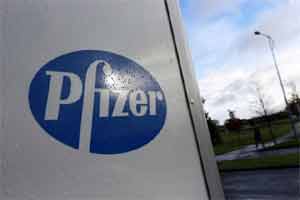In a relief to pharma major Pfizer and giving hopes for several others, the Delhi High Court on Monday stayed a government notification that banned manufacture and sale of the US-based multinational’s popular cough syrup Corex, and also directed the government not to take coercive steps against its retailers and distributors, reports fe Bureau in New Delhi.
The government had on March 10 banned the manufacture, sale and distribution for human use of 350-odd fixed dose combination (FDC) drugs — including codeine-chlorpheniramine FDC that Corex is — with immediate effect.
This followed the regulatory view that these drugs lacks therapeutic rationale.
While Corex, one of the top-selling brands in the country, garnered sales of Rs 176 crore in the first nine months of the current fiscal, it is estimated that the bans on the FDC drugs would likely impact nearly 4% or Rs 3,800 crore of the organised pharma retail market.
Justice Rajiv Sahai Endlaw, while seeking a response from the ministry of health & family welfare and the Drugs Controller General of India, stayed the March 10 ban on a petition filed by Pfizer, alleging that that no showcause notice or hearing was granted to it prior to the decision.
Corex has been in the market for the last 25 years. “How can there be ban all of a sudden, without reasons and without any hearing,” the judge observed during the hearing.
Meanwhile, the petition of Abbott Laboratories, another US-based pharma giant, against the ban on its FDC drug will come up for hearing on Tuesday.
The Pfizer stock slumped 9.34% to close at Rs 1,748 on NSE on Monday while that of Abbott’s Indian arm that fell 3% in the intra-day trade, closed 0.14% lower at Rs 4,850.
The banned 350-odd FDC drugs include wide-selling painkillers, anti-diabetic medicines and respiratory therapies.
A fixed dose combination contains two or more drugs combined in a fixed ratio of doses, and available in a single dosage form.
In Pfizer’s case, the court also asked the government counsel to take instruction on what was the finding of the expert committee, which was set up by the Centre, following which the bans have been imposed. However, the government counsel claimed that it is satisfied that there are risks in the use of the FDCs and that safer alternatives are available.
Stating that impugned notifications are illegal and arbitrary, senior counsel Kapil Sibal, appearing for Pfizer, told the court that the company was neither given any hearing nor any showcause notice was issued prior to ban.
He said that the present combination of the drug Corex had been formulated and arrived at way back in 1995 pursuant to various discussions and after the medical efficacy and therapeutic value was clearly established. Pfizer, which claims to have 49% of the market share, said that the drug with a similar pharmacology composition continues to be manufactured and sold in various other countries.
Abbott in its plea said that since it had the requisite approval for its FDC, it was not called upon to prove the safety and efficacy of the FDC. The recommendation of the expert panel that its FDC has no therapeutic justification is not sustainable in view of DCG(I)’s approval given to it as early as in 1995, it added.
“Whether the alleged alternatives are available and if so whether they are efficacious or risky is an issue which requires consultation and debate. Further, it is not disclosed, what risk was involved and what was the reliable and proven evidence or report which deserve acceptance unquestionably. Such a consultation having not been done, the so called satisfaction of the government is completely misplaced and unsupported by proven or recorded evidence,” Abbott said in its petition.
According to the pharma company, to make available alternate drugs, minimum time gap of six months is required considering the time consumed in preparation of new formulations, packaging preparations, approvals by the authorities under the Act, etc. and also the time consumed in development, analysis, stability studies, etc. Thus, the immediate ban is drastic especially when crores of worth formulations are lying distributed in retail drug shops in the country and it is practically very difficult to withdraw the products besides the huge loss that will be caused to manufacturers, the companies said, adding that it would also result in denial of access to medicines to patients across the country and to consumers who have been using FDCs products regularly.

